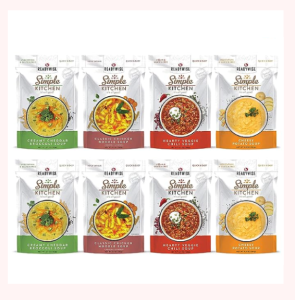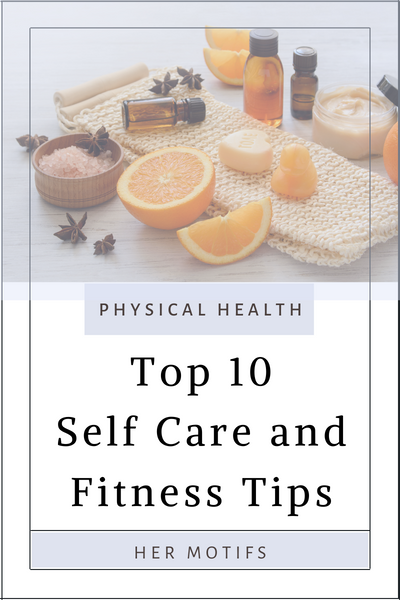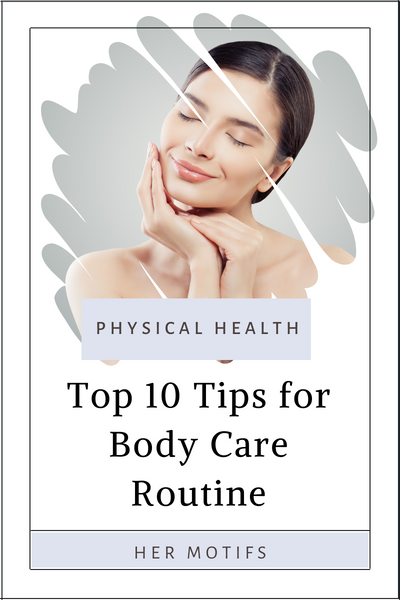Top 10 Self Care Tips When Sick
Self Care Tips When Sick  refer to practices and actions you can take to support your well-being and aid in the recovery process while you are unwell.
refer to practices and actions you can take to support your well-being and aid in the recovery process while you are unwell.
Balancing self-care and fitness is a holistic approach to well-being that speaks to the synergy of physical health and mental wellness. It’s the recognition that taking care of your body goes hand in hand with nurturing your mind and spirit.
These tips span a spectrum of practices, from mindful exercises that invigorate your body and spirit to self-care rituals that soothe your soul. Whether you’re an exercise enthusiast looking to enhance your self-care routine or someone new to the world of fitness and wellness, these insights offer a balanced and achievable path to a more vibrant and fulfilled life. There are many ways to taking care of yourself such as, physical, mental, and emotional health to promote healing and alleviate symptoms.
Some common self-care tips when sick include getting plenty of rest, staying hydrated by drinking fluids, eating nutritious foods, taking prescribed medications as directed, practicing good hygiene to prevent the spread of illness, seeking support from loved ones or healthcare professionals, and creating a comfortable environment that promotes healing.
Self-care tips when sick aim to provide the necessary care and attention your body needs during illness to help you feel better and recover sooner. When you are sick, it’s important to prioritize your self-care to help your body heal and recover.
.
Table of Contents
Best Tools When Sick
Self care is truly becoming known as self love, and we are absolutely in love with the concept and definitely incorporating it into our daily routines. The best way is to create simple steps that you can easily do. Below are some of our favorite tips and tools:
1. Rest
Resting when you’re sick offers numerous benefits for your overall well-being and recovery. When you rest, your body can redirect its energy towards fighting off the illness and healing itself. It allows your immune system to work more efficiently, helping to reduce the duration and severity of your symptoms.
Resting also conserves energy and prevents overexertion, which can lead to further strain on your body. It promotes better sleep quality, allowing your body to repair and regenerate. Additionally, taking time to rest gives you a mental break and reduces stress, allowing you to focus on self-care and recovery.
.
2. Stay Hydrated
Staying hydrated when you’re sick provides numerous benefits for your body’s recovery and overall well-being. Hydration is essential for maintaining optimal bodily functions and supporting the immune system. When you’re sick, your body may lose fluids through fever, sweating, congestion, or increased mucus production. By staying hydrated, you help replenish these lost fluids and prevent dehydration, which can worsen symptoms and prolong recovery time.
Drinking plenty of fluids also helps to thin mucus, making it easier to clear congestion and alleviate discomfort in the respiratory system. Additionally, adequate hydration supports proper digestion and nutrient absorption, ensuring your body receives the essential nutrients it needs to heal.
Furthermore, staying hydrated can help alleviate symptoms like sore throat and dry mouth, providing relief and promoting a sense of well-being. Make sure to drink water, herbal teas, clear broths, or other hydrating fluids to support your body’s healing process when you’re sick.
.
3. Eat Nourishing Foods
Eating nourishing foods when you’re sick offers several benefits that support your body’s healing and recovery process. Nutrient-dense foods provide essential vitamins, minerals, and antioxidants that support your immune system and help fight off the illness. These foods help provide the energy your body needs to combat the infection or illness and promote overall well-being. Additionally, nourishing foods can help reduce inflammation in the body, alleviate symptoms, and promote faster healing.
Fruits and vegetables, in particular, are rich in vitamins, fiber, and antioxidants, which can help boost your immune system and provide relief from symptoms. Consuming whole grains and lean proteins can provide sustained energy and support proper bodily functions. Moreover, eating nourishing foods can help maintain proper hydration levels and support digestive health. Choosing foods that are easy to digest and gentle on the stomach can also help minimize discomfort during illness.
By nourishing your body with wholesome, nutrient-rich foods, you provide the necessary building blocks for recovery, enhance your immune response, and promote overall well-being during your sickness.
.
4. Take a Warm Bath or Shower
Create an evening routine for yourself. Taking a warm bath or shower when you’re sick offers several benefits that can help alleviate symptoms and provide relief. The warm water helps to relax your muscles, soothe aches and pains, and promote a sense of comfort and well-being. It can also help to alleviate congestion and open up your nasal passages, making it easier to breathe. The steam from the warm water can help to clear your sinuses and relieve sinus pressure.
The calming effect of warm water can also help to reduce stress and promote relaxation, which is essential for supporting your immune system and aiding in the healing process. Adding essential oils, such as eucalyptus or lavender, to your bath or shower can enhance the therapeutic benefits and provide further relief.
.
5. Use a Humidifier
Using a humidifier when you’re sick can provide numerous benefits for your respiratory health and overall well-being. When you’re ill, especially with respiratory symptoms like congestion or a dry cough, the air in your environment can become dry, which can further irritate your airways.
A humidifier adds moisture to the air, creating a more humid environment that can help soothe your respiratory system. The moist air from the humidifier can help to relieve nasal congestion, loosen mucus, and alleviate dryness in your throat and nasal passages. This can make breathing easier, reduce coughing, and provide relief from symptoms.
By using a humidifier, you can create a more comfortable and healing environment that supports your recovery process. Just remember to clean and maintain the humidifier properly to avoid the growth of bacteria or mold.
.
6. Practice Deep Breathing or Meditation
Practicing deep breathing or meditation when you’re sick offers several benefits that can support your physical and mental well-being during the recovery process. Deep breathing exercises help to slow down your breathing rate, relax your body, and reduce stress levels. By taking slow, deep breaths, you can increase oxygen flow in your body and promote relaxation, which can help alleviate tension and promote a sense of calm.
This can be particularly beneficial when you’re experiencing symptoms such as shortness of breath or anxiety related to being sick. It can help reduce stress, promote mindfulness, and improve your overall mental well-being. Practicing deep breathing or meditation can also help boost your immune system by reducing stress hormones and enhancing your body’s natural healing abilities.
Incorporating these practices into your routine when you’re sick can help you manage symptoms, reduce stress, and support your overall recovery and well-being.
.
7. Be Kind to Yourself
Being kind to yourself when you’re sick is essential for your physical and emotional well-being. It involves showing compassion, patience, and understanding towards yourself during this challenging time. Being kind to yourself means listening to your body’s needs and giving yourself permission to rest and heal without guilt or judgment. By practicing self-compassion, you alleviate unnecessary stress and pressure, allowing your body to focus its energy on healing.
Being kind to yourself when sick also means seeking support and asking for help when needed. It is recognizing that it’s okay to prioritize your well-being and take the necessary steps to recover fully. This self-care practice helps to promote a positive mindset, reduce stress, and enhance your overall recovery process. By being kind to yourself, you cultivate a nurturing and supportive environment that aids in your physical healing and emotional well-being, ultimately leading to a faster and more sustainable recovery.
.
8. Seek Support
When you’re sick, seeking support in various areas can greatly assist in your recovery and well-being. Support around the house involves reaching out to family members, friends, or neighbors who can help with daily chores, preparing meals, or running errands. They can provide practical assistance that alleviates the burden on you while you focus on getting better.
Seeking medical support is essential, whether it’s through consulting healthcare professionals, visiting doctors or specialists, or seeking advice from pharmacists. These professionals can diagnose your condition, provide appropriate treatment, and monitor your progress. Additionally, seeking mental support is crucial, especially when illness takes a toll on your emotional well-being.
This can involve seeking counseling or therapy from qualified professionals who can help you navigate the emotional aspects of your illness and provide strategies for coping and resilience. Remember, seeking support in these areas can make a significant difference in your healing process and ensure you have the necessary resources and care during your time of illness.
.
9. Create a Soothing Environment
Creating a soothing environment when you’re sick can greatly contribute to your comfort and well-being. Start by making your living space clean, organized, and clutter-free, as a tidy environment can promote a sense of calm and relaxation. Adjust the lighting to a soft and gentle level that is easy on the eyes and helps create a cozy ambiance.
Consider adding elements of comfort, such as cozy blankets, pillows, and warm socks, to keep you comfortable while resting. Use a humidifier to add moisture to the air, which can alleviate congestion and dryness. Set up a bedside table with items you may need, such as tissues, water, and any medications.
By creating a soothing environment, you can enhance your sense of comfort and relaxation, allowing your body to heal more effectively.
.
10. Practice Selfcare Activities
Practicing self-care activities when you’re sick is essential for your physical and emotional well-being. Start by prioritizing rest and allowing yourself ample time to recover. Get plenty of sleep and take naps as needed to support your body’s healing process. Stay hydrated by drinking fluids like water, herbal tea, or clear broths to soothe symptoms and prevent dehydration.
Engage in gentle movements or stretches if your condition permits, as this can help improve circulation and promote overall well-being. Take time for relaxation and stress reduction through activities like meditation, deep breathing exercises, or listening to calming music.
Remember to listen to your body and adjust your self-care activities based on your symptoms and energy levels. By practicing self-care, you can support your body’s healing process and promote a faster recovery.
.
Conclusion
Seeking support from loved ones, healthcare professionals, and online communities can provide the emotional and practical assistance you may need during this time. Creating a soothing environment and practicing self-care activities, such as gentle movements, relaxation techniques, and good hygiene, can contribute to your comfort and promote a faster recovery.
Remember to listen to your body, adjust your self-care routine based on your symptoms, and be gentle with yourself as you navigate through illness. By taking care of yourself during sickness, you’re giving your body the best chance to heal and regain optimal health.
- 100 Valentine Lovers Questions - February 24, 2025
- 2025 New Year Growth Quotes - February 24, 2025
- 2025 Inspiring Self Love Quotes - February 24, 2025














